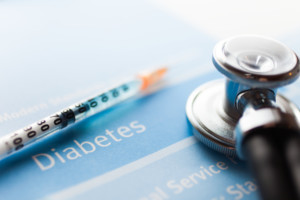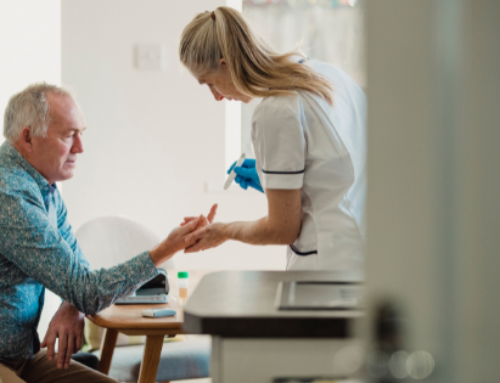 Whether you’ve been battling symptoms for a while or have noticed them only recently, receiving a diabetes diagnosis can be crippling. As with any significant medical diagnosis, you may have numerous questions about how to move forward and cope with a new way of life. To help you feel less overwhelmed, we want to carefully explore the mental and physical journey you’re about to embark on.
Whether you’ve been battling symptoms for a while or have noticed them only recently, receiving a diabetes diagnosis can be crippling. As with any significant medical diagnosis, you may have numerous questions about how to move forward and cope with a new way of life. To help you feel less overwhelmed, we want to carefully explore the mental and physical journey you’re about to embark on.
If you have any questions about any information in this article or related to your diagnosis, don’t hesitate to reach out to a Tri-City Medical Center provider for support and guidance. We offer support groups and diabetes management classes that may be valuable to you.
Stages of Acceptance
Receiving a life-changing medical diagnosis is rarely just a physical event. There are usually corresponding thoughts and emotions as you mentally digest the news. Moreover, everyone processes the various stages differently, so you may move from diagnosis to acceptance quickly, or may take a while to adjust. Read below to learn about what you can expect on a psychological level after learning you have diabetes.
Initial Denial
For some individuals, it may be difficult to accept that the diagnosis is, in fact, reality. Denial may stem from worry about the chronic nature of the disease, the fact that ongoing treatment is now a requirement, or personal self-esteem troubles. Although it may be easier to imagine that certain spikes in blood sugar are only temporary, the truth is that diabetes is a persistent condition.
Resistance
Along with denial, some diabetes patients may feel resistant to accepting a life of appointments, tests, and dietary changes. In fact, some individuals may feel so frustrated and mad that they avoid even thinking about the disease. Because diabetes can be both caused and controlled by lifestyle factors, there can be a certain level of mental pushback. It’s important to work through these feelings while not letting them stand in the way of receiving treatment.
Final Acceptance
To receive proper care and maintain a high quality of life, you must eventually move to a place of acceptance about having diabetes. Luckily, there is a welcoming and supportive diabetes community, and there are plenty of educational resources available. To reach the stage of final acceptance, you may find it helpful to listen to your body and learn ways to advocate for yourself during this transition.
Action Steps
Once you’ve made it through the mental process of your diagnosis, you’ll also want to create a plan of action to stay healthy from a physical standpoint and prevent any negative physical effects. Below are some ways that you can take charge of your physical health.
Gather Information
At first, you’re likely to encounter unfamiliar medical jargon that can make you feel overwhelmed. Soon, you’ll become an expert at terms like glucose testing, insulin, blood sugar levels, and hypoglycemia. As you start your journey, it’s wise to gather information from trusted sources like the American Diabetes Association, the Centers for Disease Control and Prevention, and your own physician.
Incorporate Medication
Managing diabetes through medication is one option as you and your doctor aim to regulate your blood sugar levels within a set range. Treatments vary based on the type of diabetes you have and what medicines will work most effectively for your particular lifestyle. Prescriptions can include insulin injections, alpha-glucosidase inhibitors, aspirin, and others.
Make Dietary Changes
When it comes to diabetes maintenance, small changes often pay off in big ways. This is particularly true when it comes to diet and meal planning. Many diabetes patients often worry about deprivation or restriction when it comes to enjoying food. While your diet may be more carefully monitored than it was before, it’s important to understand how good nutrition can contribute to healthy blood sugar levels. Collaborating with a registered dietician is often a great option if you’re worried about how to plan diabetic-friendly meals while still enjoying meal time.
Get Moving
According to the American Diabetes Association, “exercise is a key component of proper diabetes care.” Although getting motivated to incorporate fitness can sometimes be a challenge for anyone, increased exercise not only helps regulate blood sugar levels, but also has a positive effect on your mental state. Start by incorporating small changes, such as short walks after dinner or taking the stairs instead of using an elevator.
Enlist a Care Team
If you’ve recently received a diabetes diagnosis, the most important thing to remember is that you’re not alone. Do your research on what it means to stay healthy in this new phase of life, but plan to enlist a team of care providers who can answer your questions, respond to your concerns, and help you navigate new steps and choices. As always, make sure to visit your Tri-City Medical Center physician for regular visits as part of your ongoing diabetes maintenance.

![Diabetes in the Body: The Different Ways Diabetes Can Affect You [Infographic]](https://www.tricitymed.org/wp-content/uploads/2018/11/diabetes-500x383.png)